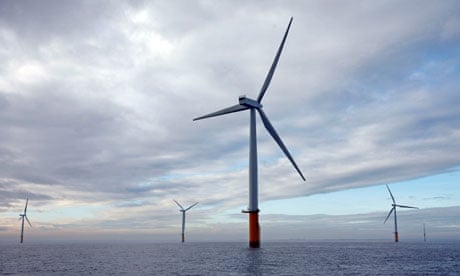The government will lay out plans on Tuesday to create a huge offshore wind industry in the UK, with new targets going far further than even its own advisers have recommended.
Instead of the 13GW of offshore wind power by 2020 called for by the Committee on Climate Change – the statutory body that advises ministers on carbon emissions targets and how to meet them – the government wants the UK to have as much as 18GW by the same date.
An industry taskforce will be set up to drive forward the plans, with the aim of bringing down the cost of offshore wind from about £140 to £170 per megawatt hour produced today to about £100 a megawatt hour by 2020. That would make offshore wind competitive with other forms of production, which should reduce the need for subsidies in the long term.
The plans will call for subsidies funded by increases in the electricity bills of homes and businesses, billions of pounds of investments from overseas turbine manufacturers, potentially creating tens of thousands of jobs, and an overhaul of port infrastructure.
Chris Huhne, the climate change and energy secretary, will set out the renewable energy overhaul alongside proposals for other far-reaching reforms of the electricity market, to be announced to parliament on Tuesday . The reforms – the biggest shakeup of the energy market since privatisation two decades ago – are intended to encourage energy companies to make long-term investments in low-carbon energy while keeping down the costs to electricity consumers. They will include reforms to the subsidy regime and new contracts for electricity providers to ensure they keep the lights on while stimulating energy efficiency improvements.
But business groups and green campaigners have attacked the plans, saying they could be costly and may not go far enough respectively. There are fears, in both the industry and environmental pressure groups, that the plans are a way of subsidising nuclear energy without appearing to do so directly, because some of the reforms will benefit all forms of "low-carbon electricity", which will be taken to include nuclear reactors. The coalition has pledged not to subsidise the nuclear industry "directly" but by including it with renewable forms of generation, it can get round this stipulation.
Neil Bentley, deputy director general of the CBI, criticised the complexity of some reforms, which include complex mechanisms such as "contracts for difference" and "capacity payments". He said: "We're looking for absolute clarity on how the costs [of the £200bn overhaul of the UK's energy infrastructure] will be paid for."
Andy Atkins, director of Friends of the Earth, accused the government of creating the right conditions for a new "dash for gas", which would leave the UK more dependent than ever on gas-fired power generation. He warned this was not a long-term solution for decarbonising the electricity supply, which the Committee on Climate Change has said must be achieved by 2030 if the UK's legally binding climate targets are to be met.
Louise Hutchins, of Greenpeace, said that recent price rises in domestic energy bills were due in part to the import of fossil fuels, such as gas. She said: "Consumers are bearing the brunt of colossal price hikes in domestic energy bills because of the over reliance of the big six energy suppliers on importing expensive fossil fuels while at the same time ignoring clean energy sources around our shores." She said the white paper should address the "stranglehold" of the big six energy companies, which supply 99% of the UK's energy, over the bills of ordinary people.





Comments (…)
Sign in or create your Guardian account to join the discussion